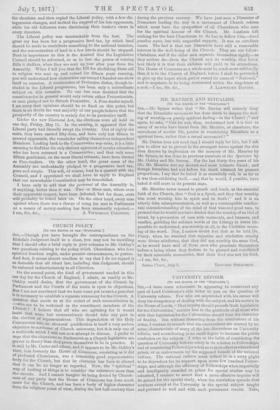MR. MAURICE AND RITUALISM.
en THE EDITOR OF THE SPEOTATOR.1
Slit,—Mr. Symes writes that " Mr. Davies will scarcely deny that the Ritualistic movement has done much to deepen the feel- ing of worship—a purely spiritual feeling—in the Church i" and again, he asks, " Can he not, then, understand how it is that so many of us who have learnt from Mr. Maurice, or elsewhere, the sacredness of secular life, persist in considering Ritualism as a spiritual force, rather than a carnal movement? "
Mr. Davies does not need that I should reply for him, but I ask you to allow me to protest in the strongest terms against the slur thus thrown by implication on the memory of Mr. Maurice by Mr. Symes, as was done in previous numbers of the Spectator by Mr. Oakley and Mr. Sarson. For the last thirty-five years of his life, Mr. Maurice was my dearest and most intimate friend ; and though Ritualism had not before his death attained its present proportions, I say that he hated it as essentially evil, in as far as it was then exhibiting itself,—and that he would, if possible, have hated it still more in its present state.
Mr. Maurice never ceased to preach and teach, as the essential faith of the Church, that " God is a Spirit, and they that worship him must worship him in spirit and in truth ;" and it is an utterly false misrepresentation, as well as a contemptible intellec- tual misunderstanding of the mind of that wise and good man, to pretend that he would not have denied that the worship of an idol of bread, by a procession of men with vestments, and banners, and candles, gabbling the sublime words of the Liturgy in tones im- possible to understand, was worship at all in the Christian mean- ing of the word. Nay, I cannot doubt but that as he told Dr. Pusey, when he asserted that injustice and vindictive cruelty were divine attributes, that they did not worship the same God, so he would have said of those men who prostrate themselves before a being whom they declare to be pleased and conciliated by their miserable mummeries, that their God was not his God. —I am, Sir, &c.,


































 Previous page
Previous page